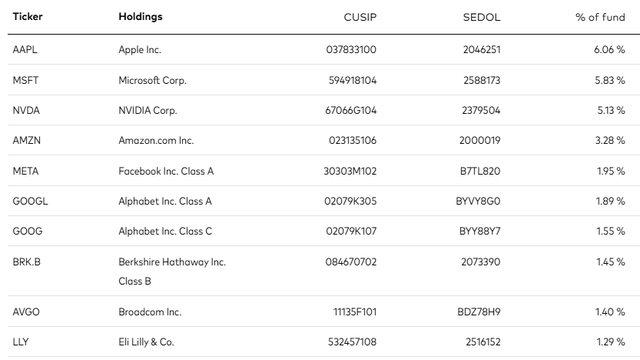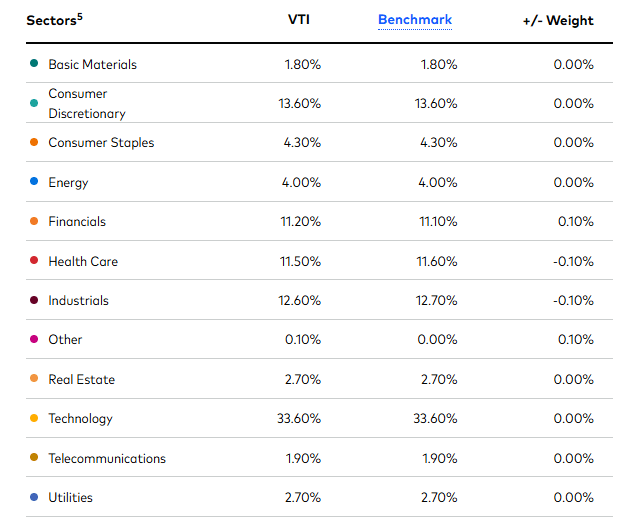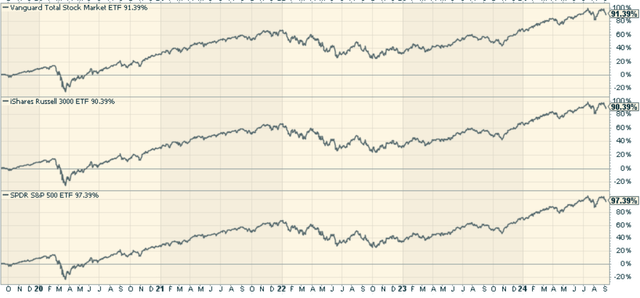VTI: Likely Better Than SPY Now
Jonathan Kitchen
Time in the market versus timing the market. The latter typically doesn't work. But there's a nuance there. Which market are we talking about? Because some markets have better relative momentum than others. To that end, I think timing large-cap only portfolios by positioning more towards mid and small-caps makes sense.
If you agree, but still want some large-cap exposure, then you may want to consider the Vanguard Total Stock Market Index Fund ETF Shares (NYSEARCA:VTI). This fund aims to match the CRSP US Total Market Index, giving investors a stake in small, medium, and large growth and value stocks. VTI's low fees and full market coverage make it a good pick for investors who want to tap into the overall health of the U.S. economy, while having more than just pure large-cap exposure as the proxy for "the market."
A Look At The Holdings
This fund is comprehensive. It has over 3600 positions, and is market-cap weighted. That means that, yes, even though it's got mid and small-cap equities, it's still dominated by large-cap players. And it's all the familiar ones, too.
vanguard.com
Looking at what VTI owns, we see a mix of companies that mirrors the broader U.S. market. No wonder the median market cap is $178 billion. If you're worried about large-caps, you may want to position into a fund that more explicitly is mid or small-cap in nature. Still, this is a pretty good proxy for what drives most indexed portfolios at the top.
Sector Allocation
VTI's sector mix leans towards tech, which shows how tech companies rule the U.S. market. That sector alone makes up a third of the fund. Again - makes sense. But timing the market? That means timing a lot of sector exposure. Personally, I prefer funds that have far less tech exposure at this point in the cycle, but I get why it's such a large allocation here.
vanguard.com
Peer Comparison
When you compare VTI to ETFs like the SPDR S&P 500 ETF Trust (SPY) and the iShares Russell 3000 ETF (IWV), you'll notice that SPY has outperformed because it has not been held back by small and mid-cap stocks in this cycle. VTI covers more of the market than SPY, which tracks the S&P 500 Index (SP500) and focuses on just big companies. I think mid and small are due to work, so I'd rather choose VTI than SPY at this point.
stockcharts.com
Pros and Cons
Putting money into VTI has several positives. Its low fees (a shocking 0.03% expense ratio) are a big plus, helping investors hold on to more of their profits. The fund spreads risk across the whole market, which cuts down on the dangers of buying single stocks or sectors, giving a well-rounded way to join in market gains. What's more, VTI is easy to buy and sell, making it a handy pick for people looking to invest for the long haul and those wanting to make quick changes to their investment mix.
But we should also think about the possible drawbacks. VTI depends a lot on the U.S. market, so how well it does is linked to the U.S. economy's health. When the economy slows down or markets get shaky, the fund might see big ups and downs. Furthermore, because it has so many tech stocks, investors could face risks specific to that sector if tech companies hit rough patches. And while it is well diversified, I'd much prefer it have more exposure to small and mid-cap stocks than still be so dominated by the large-cap end of the spectrum.
Conclusion
Overall, the Vanguard Total Stock Market Index Fund ETF Shares is a good fund for what it does and incredibly inexpensive. It gives investors a great way to get exposure to the whole U.S. stock market. It's cheap to own, covers just about everything, and is easy to buy and sell. This makes it a good choice for plenty of different kinds of investors. But before jumping in, you should think about how it depends on the U.S. economy and how big tech companies can sway its performance. If those worry you, then skip this for now. Or, perhaps, time it after a dislocation takes place.
Disclaimer: Investing carries risk. This is not financial advice. The above content should not be regarded as an offer, recommendation, or solicitation on acquiring or disposing of any financial products, any associated discussions, comments, or posts by author or other users should not be considered as such either. It is solely for general information purpose only, which does not consider your own investment objectives, financial situations or needs. TTM assumes no responsibility or warranty for the accuracy and completeness of the information, investors should do their own research and may seek professional advice before investing.
Most Discussed
- 1
- 2
- 3
- 4
- 5
- 6
- 7
- 8
- 9
- 10